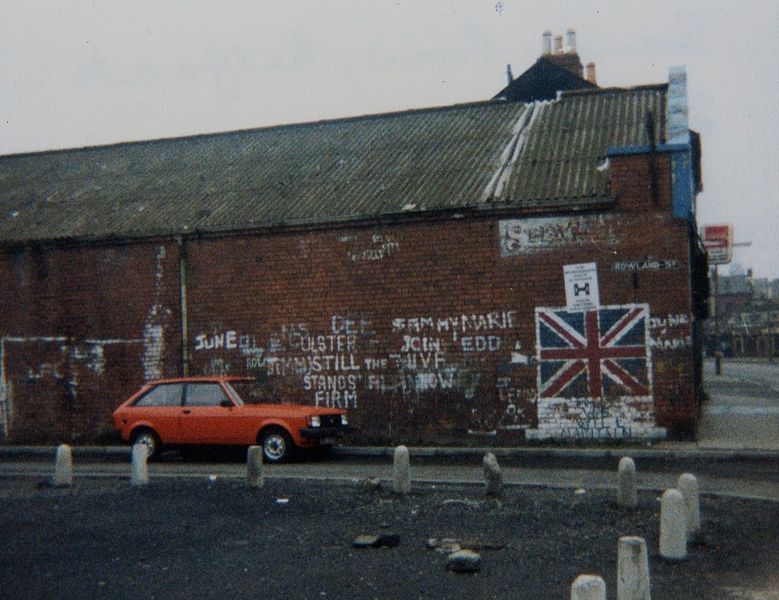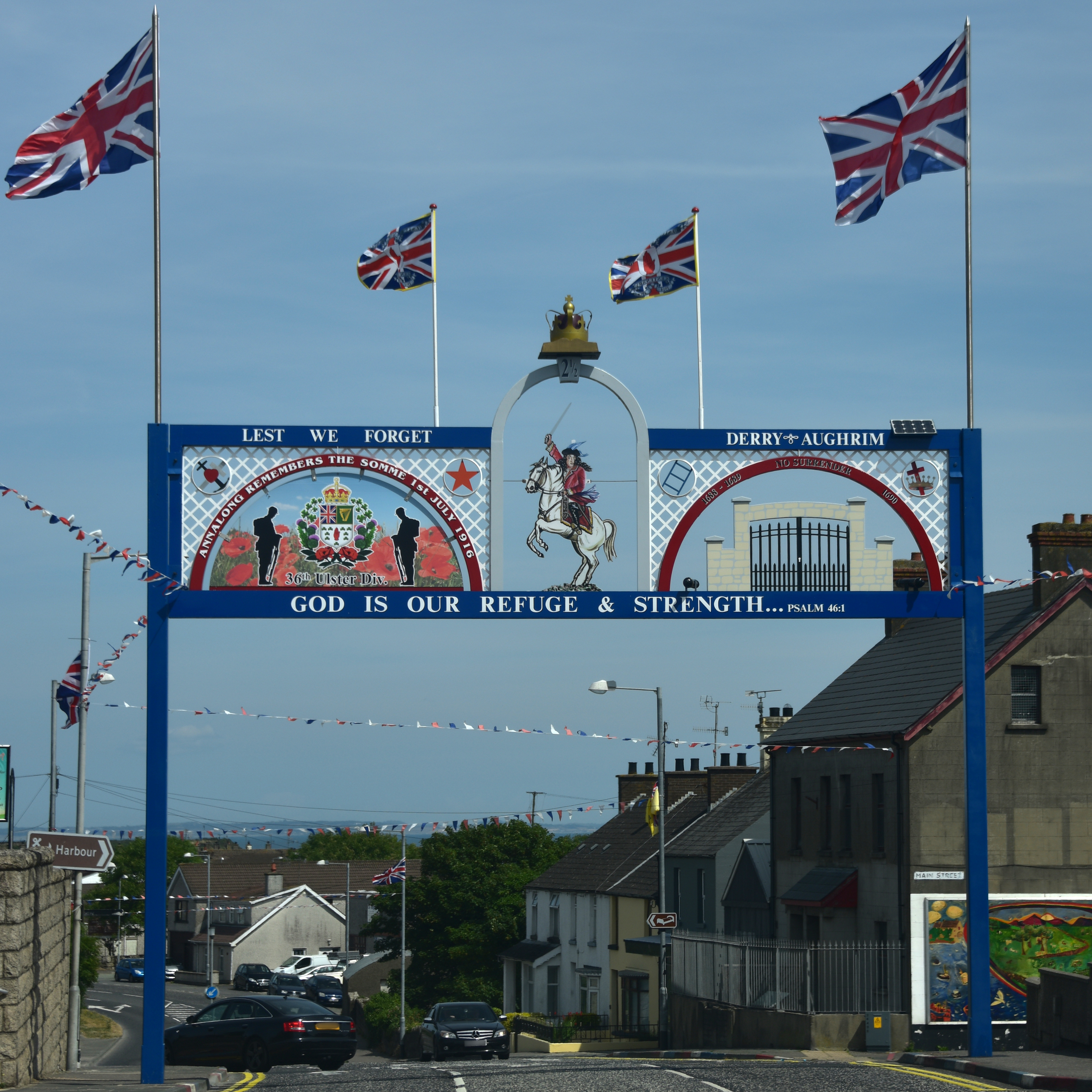|
Murder Of Ann Ogilby
The murder of Ann Ogilby, also known as the "Romper Room murder", took place in Sandy Row, south Belfast, Northern Ireland on 24 July 1974. It was a punishment killing, carried out by members of the Sandy Row women's Ulster Defence Association (UDA) unit. At the time the UDA was a legal Ulster loyalist paramilitary organisation. The victim, Ann Ogilby, a Protestant single mother of four, was beaten to death by two teenaged girls after being sentenced to a "rompering" (UDA slang term for a torture session followed by a fatal beating) at a kangaroo court. Ogilby had been having an affair with a married UDA commander, William Young, who prior to his internment, had made her pregnant. His wife, Elizabeth Young, was a member of the Sandy Row women's UDA unit. Ogilby had made defamatory remarks against Elizabeth Young in public regarding food parcels. Eight weeks after Ogilby had given birth to Young's son, the women's unit decided that Ogilby would pay for both the affair and remarks ... [...More Info...] [...Related Items...] OR: [Wikipedia] [Google] [Baidu] |
The Troubles
The Troubles ( ga, Na Trioblóidí) were an ethno-nationalist conflict in Northern Ireland that lasted about 30 years from the late 1960s to 1998. Also known internationally as the Northern Ireland conflict, it is sometimes described as an "irregular war" or "Low-intensity conflict, low-level war". The conflict began in the late 1960s and is usually deemed to have ended with the Good Friday Agreement of 1998. Although the Troubles mostly took place in Northern Ireland, at times violence spilled over into parts of the Republic of Ireland, England and mainland Europe. The conflict was primarily political and nationalistic, fuelled by historical events. It also had an Ethnic group, ethnic or sectarian dimension but despite use of the terms 'Protestant' and 'Catholic' to refer to the two sides, it was not a Religious war, religious conflict. A key issue was the Partition of Ireland, status of Northern Ireland. Unionism in Ireland, Unionists and Ulster loyalism, loyalists, who for ... [...More Info...] [...Related Items...] OR: [Wikipedia] [Google] [Baidu] |
Maze Prison
Her Majesty's Prison Maze (previously Long Kesh Detention Centre, and known colloquially as The Maze or H-Blocks) was a prison in Northern Ireland that was used to house alleged paramilitary prisoners during the Troubles from August 1971 to September 2000. It was situated at the former Royal Air Force station of Long Kesh, on the outskirts of Lisburn. This was in the townland of Maze, about southwest of Belfast. The prison and its inmates were involved in such events as the 1981 hunger strike. The prison was closed in 2000 and demolition began on 30 October 2006, but on 18 April 2013 it was announced by the Northern Ireland Executive that the remaining buildings would be redeveloped into a peace centre. Background Following the introduction of internment in 1971, Operation Demetrius was implemented by the Royal Ulster Constabulary (RUC) and British Army with raids for 452 suspects on 9 August 1971. The RUC and army arrested 342 Irish nationalists, but key Provisional Irish R ... [...More Info...] [...Related Items...] OR: [Wikipedia] [Google] [Baidu] |
The Times
''The Times'' is a British daily national newspaper based in London. It began in 1785 under the title ''The Daily Universal Register'', adopting its current name on 1 January 1788. ''The Times'' and its sister paper ''The Sunday Times'' (founded in 1821) are published by Times Newspapers, since 1981 a subsidiary of News UK, in turn wholly owned by News Corp. ''The Times'' and ''The Sunday Times'', which do not share editorial staff, were founded independently and have only had common ownership since 1966. In general, the political position of ''The Times'' is considered to be centre-right. ''The Times'' is the first newspaper to have borne that name, lending it to numerous other papers around the world, such as ''The Times of India'', ''The New York Times'', and more recently, digital-first publications such as TheTimesBlog.com (Since 2017). In countries where these other titles are popular, the newspaper is often referred to as , or as , although the newspaper is of nationa ... [...More Info...] [...Related Items...] OR: [Wikipedia] [Google] [Baidu] |
Robert Fisk
Robert Fisk (12 July 194630 October 2020) was a writer and journalist who held British and Irish citizenship. He was critical of United States foreign policy in the Middle East, and the Israeli government's treatment of Palestinians. His stance earned him praise from many commentators, but was condemned by others. As an international correspondent, he covered the civil wars in Lebanon, Algeria, and Syria, the Iran–Iraq conflict, the wars in Bosnia and Kosovo, the Soviet invasion of Afghanistan, the Islamic revolution in Iran, Saddam Hussein's invasion of Kuwait, and the U.S. invasion, and occupation of Iraq. An Arabic speaker, he was among the few Western journalists to interview Osama bin Laden, which he did three times between 1993 and 1997. He began his journalistic career at the ''Newcastle Chronicle'' and then the '' Sunday Express''. From there, he went to work for ''The Times'' as a correspondent in Northern Ireland, Portugal and the Middle East; in the last role ... [...More Info...] [...Related Items...] OR: [Wikipedia] [Google] [Baidu] |
Donegall Road
The Donegall Road is a residential area and road traffic thoroughfare that runs from Shaftesbury Square on what was once called the "Golden Mile" to the Falls Road in west Belfast. The road is bisected by the Westlink – M1 motorway. The largest section of the road, east of the Broadway junction with the Westlink, has a community which self-identifies as predominantly Protestant while the community on the other side of the Westlink – M1 motorway self-identifies as predominantly Catholic. Overview The eastern side the road and the streets leading from it, are predominantly Protestant and include the well-known Sandy Row and The Village areas. The Village, an area centred on the loyalist section of Broadway and vaguely conforming to the upper half of the Protestant section of the road, was said to have been given the name by African-American GIs stationed at a base on Maldon Street during the Second World War, who described their occasional trips to the shops in the area as ... [...More Info...] [...Related Items...] OR: [Wikipedia] [Google] [Baidu] |
Bloody Friday (1972)
Bloody Friday is the name given to the bombings by the Provisional Irish Republican Army (IRA) in Belfast, Northern Ireland on 21 July 1972, during the Troubles. At least twenty bombs exploded in the space of eighty minutes, most within a half hour period. Most of them were car bombs and most targeted infrastructure, especially the transport network. Nine people were killed: five civilians, two British soldiers, a Royal Ulster Constabulary (RUC) reservist, and an Ulster Defence Association (UDA) member, while 130 were injured.Northern Ireland Office news-sheet (CAIN) The IRA said it sent telephoned warnings at least t ... [...More Info...] [...Related Items...] OR: [Wikipedia] [Google] [Baidu] |
Provisional Irish Republican Army
The Irish Republican Army (IRA; ), also known as the Provisional Irish Republican Army, and informally as the Provos, was an Irish republican paramilitary organisation that sought to end British rule in Northern Ireland, facilitate Irish reunification and bring about an independent, socialist republic encompassing all of Ireland. It was the most active republican paramilitary group during the Troubles. It saw itself as the army of the all-island Irish Republic and as the sole legitimate successor to the original IRA from the Irish War of Independence. It was designated a terrorist organisation in the United Kingdom and an unlawful organisation in the Republic of Ireland, both of whose authority it rejected. The Provisional IRA emerged in December 1969, due to a split within the previous incarnation of the IRA and the broader Irish republican movement. It was initially the minority faction in the split compared to the Official IRA, but became the dominant faction by 1972. T ... [...More Info...] [...Related Items...] OR: [Wikipedia] [Google] [Baidu] |
Irish Nationalism
Irish nationalism is a nationalist political movement which, in its broadest sense, asserts that the people of Ireland should govern Ireland as a sovereign state. Since the mid-19th century, Irish nationalism has largely taken the form of cultural nationalism based on the principles of national self-determination and popular sovereignty.Sa'adah 2003, 17–20.Smith 1999, 30. Irish nationalists during the 18th, 19th, and 20th centuries such as the United Irishmen in the 1790s, Young Irelanders in the 1840s, the Fenian Brotherhood during the 1880s, Fianna Fáil in the 1920s, and Sinn Féin styled themselves in various ways after French left-wing radicalism and republicanism. Irish nationalism celebrates the culture of Ireland, especially the Irish language, literature, music, and sports. It grew more potent during the period in which all of Ireland was part of the United Kingdom, which led to most of the island gaining independence from the UK in 1922. Irish nationalists believ ... [...More Info...] [...Related Items...] OR: [Wikipedia] [Google] [Baidu] |
Ulster Unionism
Unionism is a political tradition on the island of Ireland that favours political union with Great Britain and professes loyalty to the British Crown and constitution. As the overwhelming sentiment of Ireland's Protestant minority, following Catholic Emancipation (1829) unionism mobilised to keep Ireland part of the United Kingdom and to defeat the efforts of Irish nationalists to restore a separate Irish parliament. Since Partition (1921), as Ulster Unionism its goal has been to maintain Northern Ireland as part of the United Kingdom and to resist a transfer of sovereignty to an all-Ireland republic. Within the framework of a 1998 peace settlement, unionists in Northern Ireland have had to accommodate Irish nationalists in a devolved government, while continuing to rely on the link with Britain to secure their cultural and economic interests. Unionism became an overarching partisan affiliation in Ireland in response to Liberal-minority government concessions to Irish nat ... [...More Info...] [...Related Items...] OR: [Wikipedia] [Google] [Baidu] |
The Twelfth
The Twelfth (also called Orangemen's Day) is an Ulster Protestant celebration held on 12 July. It began in the late 18th century in Ulster. It celebrates the Glorious Revolution (1688) and victory of Protestant King William III of England, William of Orange over Roman Catholicism, Catholic King James II of England, James II at the Battle of the Boyne (1690), which ensured a Protestant Ascendancy in Ireland. On and around the Twelfth, large parades are held by the Orange Order and Ulster loyalist marching bands, streets are bedecked with British flags and bunting, and Eleventh Night, large towering bonfires are lit in loyalist neighbourhoods. Today the Twelfth is mainly celebrated in Northern Ireland, where it is a Public holidays in the United Kingdom, public holiday, but smaller celebrations are held in other countries where Orange lodges have been set up. Since its beginning, the Twelfth has often been accompanied by violence between Ulster Protestants and Catholics, especi ... [...More Info...] [...Related Items...] OR: [Wikipedia] [Google] [Baidu] |
Orange Order
The Loyal Orange Institution, commonly known as the Orange Order, is an international Protestant fraternal order based in Northern Ireland and primarily associated with Ulster Protestants, particularly those of Ulster Scots heritage. It also has lodges in England, Scotland and the Republic of Ireland, as well as in parts of the Commonwealth of Nations, Togo and the United States. The Orange Order was founded by Ulster Protestants in County Armagh in 1795, during a period of Protestant–Catholic sectarian conflict, as a fraternity sworn to maintain the Protestant Ascendancy in Ireland. It is headed by the Grand Orange Lodge of Ireland, established in 1798. Its name is a tribute to the Dutch-born Protestant king William of Orange, who defeated Catholic king James II in the Williamite–Jacobite War (16881691). The order is best known for its yearly marches, the biggest of which are held on or around 12 July (The Twelfth), a public holiday in Northern Ireland. The Orange O ... [...More Info...] [...Related Items...] OR: [Wikipedia] [Google] [Baidu] |








